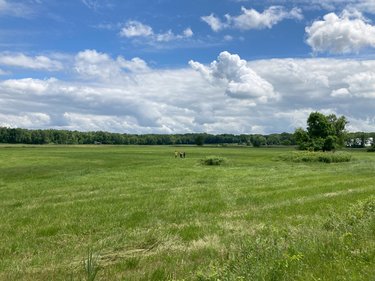Heath Farm harvests $50K grant to assess water, improve soil
— Photo from Lauren Chiyoko Axford
The Heath Farm in Bethlehem now grows hay. But a grant from the state may lead to enriched soil that will support other crops as well. Pictured in the background are a soil scientist from the USDA, Susan Lewis from Albany County Soil & Water, and Bethlehem Open Space Coordinator Lauren Chiyoko Axford.
BETHLEHEM — The town of Bethlehem has been awarded $50,000 among $2.5 million that the state’s agriculture department is giving to urban farms and community gardens across New York.
“It’s a step in the right direction to creating a hospitable environment for viable farm businesses,” said Lauren Chiyoko Axford who is the town’s open space coordinator.
Bethlehem purchased the 9-parcel, 307-acre property to preserve the land, which has been farmed continuously since at least the Revolutionary War, and has since developed a vision plan, published earlier this year by the Historic Heath Farm Advisory Committee, that fleshes out long- and short-term goals.
Each goal is meant to address in some way one of several “core issues” the vision plan identifies, namely: farmland preservation, agricultural education or other supplemental uses of farmland, developing regenerative farming practices and incubating next-generation farmers, climate resiliency, and community well-being.
“We’re not looking to create an agrotourism location,” Axford told The Enterprise.
Rather, she said, “The goal is to continue to have it actively farmed but to also create some access opportunities for what we’re kind of coining ‘the next generation of farmers.’”
She noted that there are a lot of entry barriers for first-generation farmers. “It’s very expensive,” said Axford.
The land is currently being farmed for hay, she said, “so water is not an issue.”
But the goal, with the grant, is to look at water sources for irrigation and also to enrich the soil on five acres.
“The overarching vision for the Heath Farm,” Axford wrote in an email to The Enterprise, “is to provide land access opportunities for farmers while also providing points of public access and involvement through education and recreation.”
The barn was previously hooked up to public water and the grant will support doing that again.
Water is also needed for irrigation, and the grant, Axford said, will “pay for the existing wells to be assessed.”
Asked how many wells the farm has, she said, “To be determined. You know, records aren’t great … I definitely know where two are. And I have an inkling there’s additional ones.”
Pump tests will be done, Axford said, as well as baseline soil tests.
Five acres of land will be used as a model to improve the soil, transitioning those acres from conventional hay with two years of intensive cover-cropping to build up soil health and quality.
“Cover-cropping,” Axford explained, “is basically growing crops not for harvest but to till back into the earth or to provide various types of soil improvements.”
Bethlehem will use its town procurement/solicitation process to contract with someone to do this work, she said.
American Farmland Trust, Cornell Cooperative Extension Harvest NY, Farmers of Color Land Trust, and the Bethlehem Environmental Commons provided a joint-letter of support to the state for the project.
A free public workshop will be presented at the end of the grant to share results and lessons learned, said Axford.
She concluded, “The town’s intent is to continue to seek grant funding and proceed stepwise toward implementing recommendations from the Historic Heath Farm Initiative’s Vision Plan to create viable agricultural opportunities for farmers and farm operations which, in turn, will benefit all community members through increased local food production and distribution, improved environmental conditions, and a strengthened, more resilient regional foodshed.”

